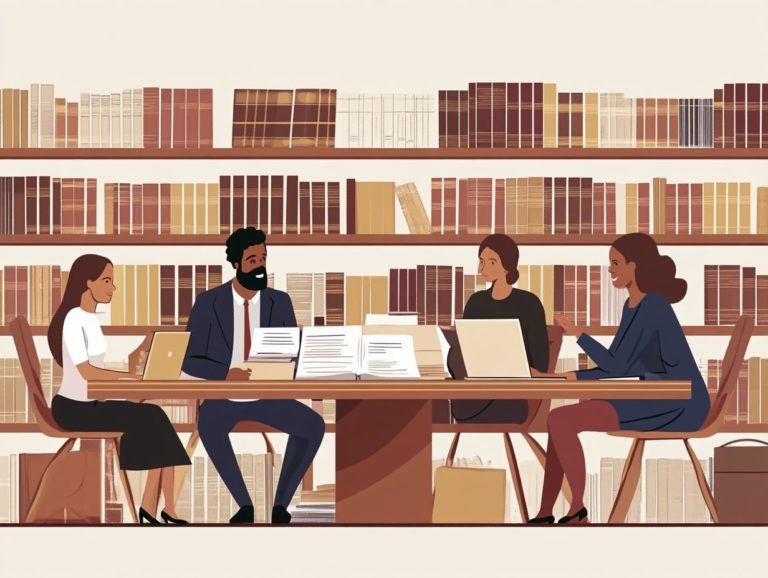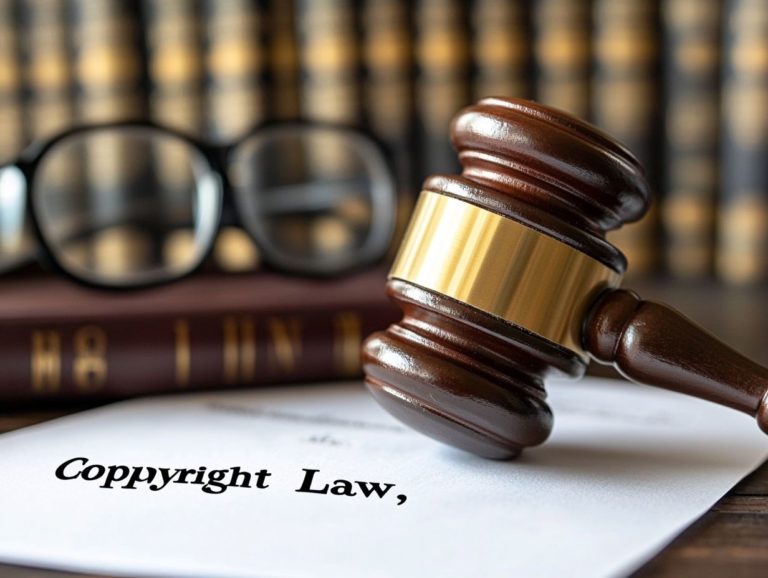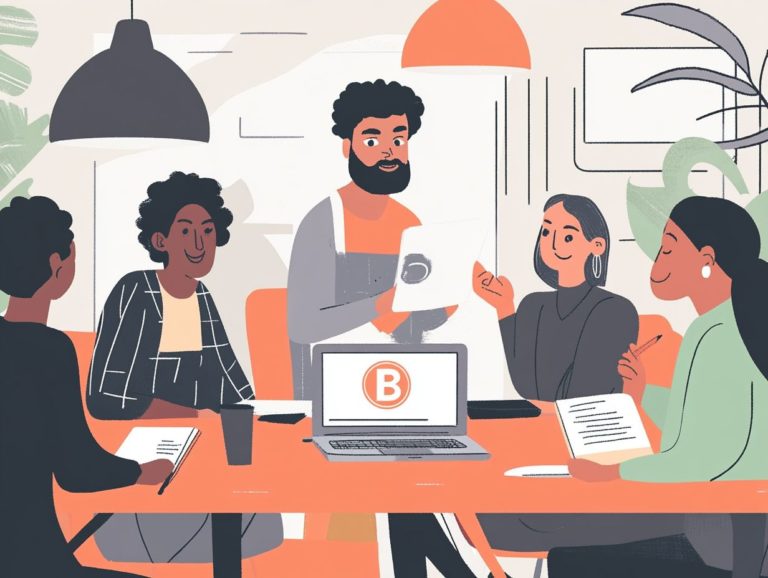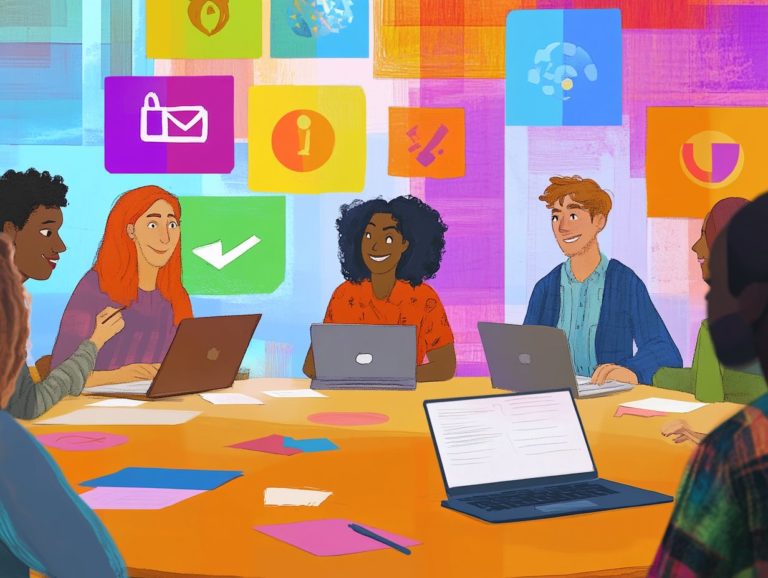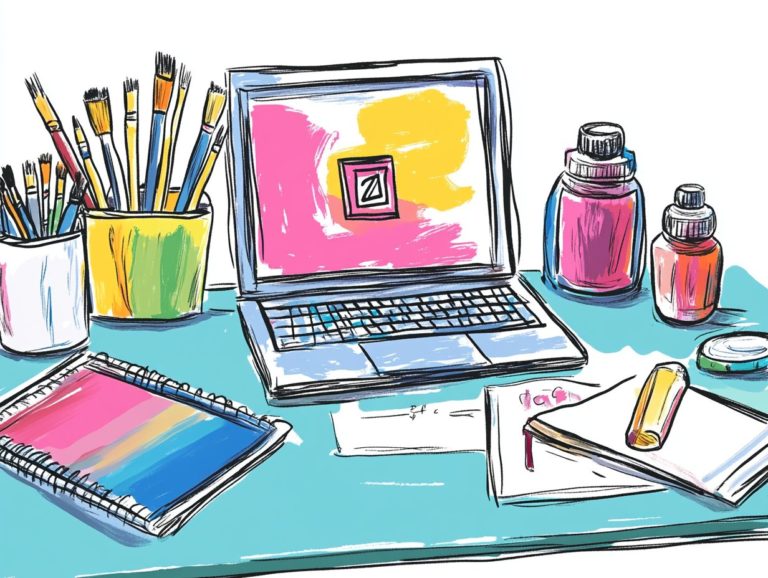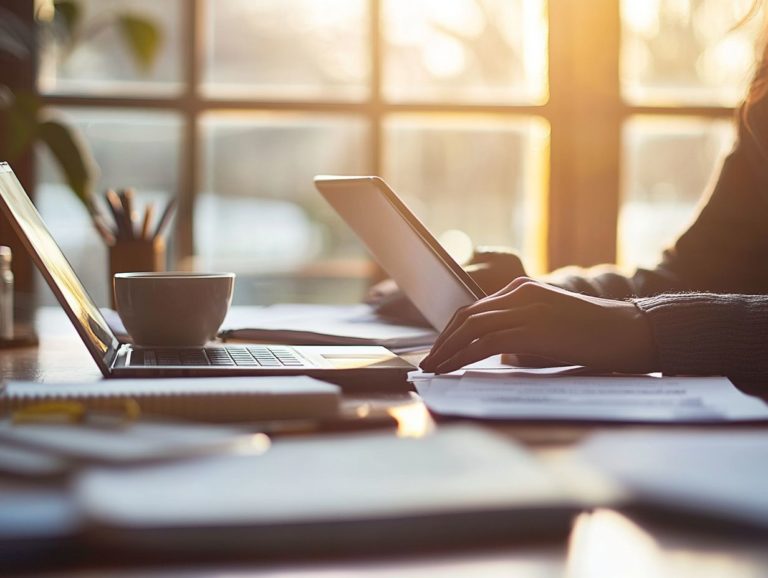Understanding Copyright Infringement Cases
Copyright infringement is a pressing issue in today s digital landscape. It impacts creators, businesses, and consumers in profound ways.
This guide explores the concept of copyright infringement. It examines its various forms, including direct infringement, where you directly use the work; contributory infringement, where you help someone else infringe; and vicarious infringement, where you benefit from someone else’s infringement.
We will also discuss notable legal cases and their outcomes. These cases shed light on the serious repercussions that can stem from violating copyright laws.
You ll find practical tips designed to help you navigate the complexities of copyright and ensure compliance. Whether you re an artist, a business owner, or simply someone intrigued by the topic, this information will arm you with the essential knowledge needed to safeguard your creative rights.
Contents
Key Takeaways:
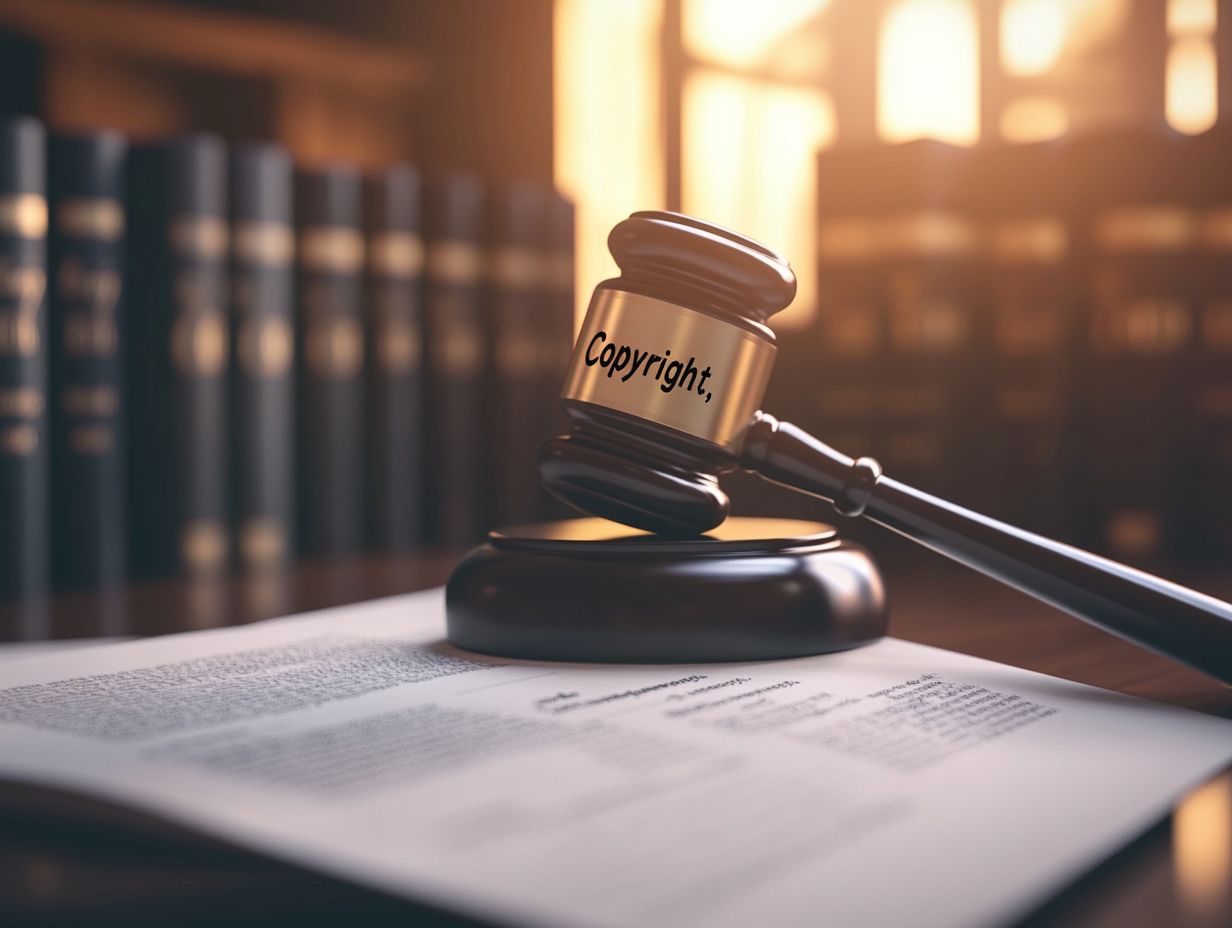
Copyright infringement is the unauthorized use of someone else’s original work, which can result in legal consequences and damages. There are three types of copyright infringement: direct, contributory, and vicarious. Each can lead to different legal outcomes.
To avoid copyright infringement, it’s important to understand the legal boundaries and best practices for using others’ work. Always obtain permission or use only original content.
What is Copyright Infringement?
Copyright infringement occurs when someone uses, distributes, or reproduces an original work without permission. This action violates the exclusive rights of the copyright owner.
This legal framework safeguards a range of artistic expressions think music, film, photography, and digital content. It ensures that creators maintain control over their creations.
When infringement occurs, it can lead to significant damages, lawsuits, and cease and desist orders aimed at halting unauthorized use.
Understanding copyright infringement is crucial for everyone creators and consumers alike. It s your best defense against potential legal troubles.
Defining the Concept
Defining copyright infringement means grasping how the exclusive rights granted to copyright owners are compromised when their original works are used without permission.
These exclusive rights include the ability to reproduce, distribute, and publicly display original works think music, literature, and visual art.
For instance, when a song is played on a radio station without consent or a painting is reproduced in a magazine without the artist s approval, those actions can potentially infringe on the creator’s rights.
Many individuals mistakenly believe that sharing a digital copy or posting an image online is covered by fair use. They may not realize that such contexts may not always shield them from infringement.
The law aims to strike a balance between the interests of creators and the public. It ensures that artists can protect their unique expressions while also encouraging the sharing of creative content.
Types of Copyright Infringement
Grasping the intricacies of copyright infringement is crucial for both creators and users. This knowledge illuminates the myriad ways copyright laws can be breached, exposing infringers to potential legal liability.
Direct Infringement
Direct infringement occurs when you or anyone else uses an original work without obtaining permission from the copyright owner. This act violates their exclusive rights.
For example, if a filmmaker features a popular song in their movie without securing the necessary licensing, they are engaging in direct infringement. Similarly, if a student reproduces a textbook for distribution without authorization, that too falls under this category.
Legal precedents, like the landmark case of ‘Rogers v. Koons,’ showcase how courts typically lean in favor of copyright owners, safeguarding their creative contributions.
The consequences of such infringements can be serious, including monetary damages and injunctions to prevent further use. For a deeper insight, you can explore understanding patent infringement in litigation, as copyright holders have various pathways for recourse.
Contributory Infringement
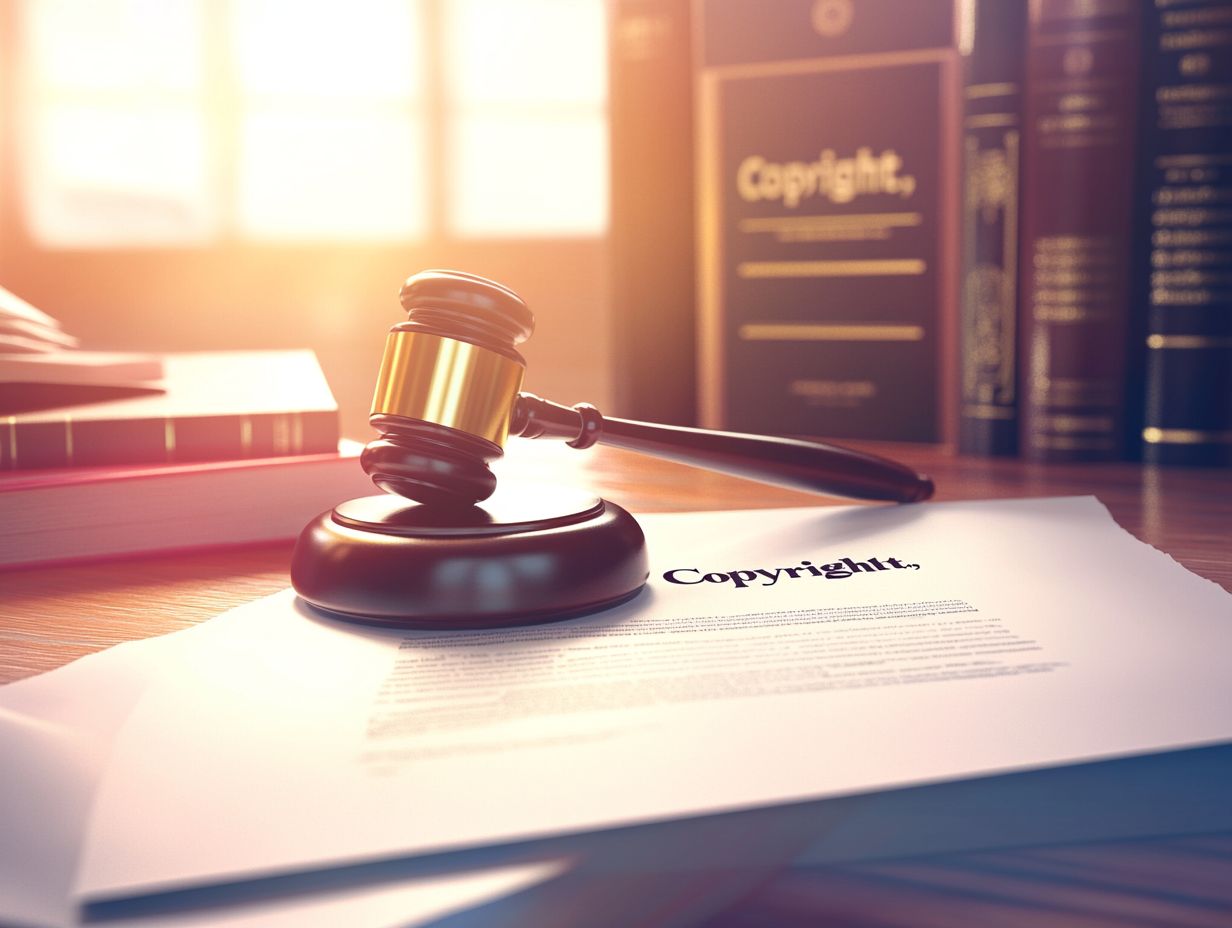
Contributory infringement refers to helping others break copyright laws. While you may not be directly involved, knowing about the infringement puts you in a tricky spot.
This legal concept is increasingly important in today s digital world, where platforms hosting user-generated content can accidentally get caught in copyright disputes. For instance, in the landmark case of ‘Grokster,’ the Supreme Court ruled that an entity can be held liable for contributory infringement if it actively encourages users to infringe copyright, even without directly engaging in the infringing acts.
Similarly, social media platforms must monitor and address copyright violations carefully to avoid potential liability. These implications highlight a crucial challenge that all businesses face today! It s essential for companies to adopt strict compliance measures to navigate this complex landscape effectively.
Vicarious Infringement
Vicarious infringement arises when you have the authority and ability to control an infringing activity while also benefiting financially, even if you aren’t the one directly infringing.
This legal concept emphasizes the responsibilities that organizations and individuals carry in protecting intellectual property rights.
Take the infamous Napster case, for example. The court determined that the platform was liable for the copyright infringements of its users because it had the power to control those activities and profited from them.
Similarly, in MGM Studios, Inc. v. Grokster, Ltd., the court ruled that Grokster could be held accountable for users sharing copyrighted materials.
These cases serve as a reminder that both companies and individuals must take proactive steps to avoid vicarious infringement, ensuring they neither facilitate nor profit from unauthorized actions.
Examples of Copyright Infringement Cases
Examining notable examples of copyright infringement cases provides valuable insights into understanding copyright infringement in IP litigation and highlights the diverse outcomes that can arise depending on each situation’s unique circumstances.
Famous Cases and Their Outcomes
Famous copyright infringement cases, like those involving Marvin Gaye and Robin Thicke, reveal ongoing challenges in copyright law and its interpretation regarding artistic expression.
These landmark disputes illustrate the delicate balance between protecting creative originality and allowing artists to draw inspiration from those who came before them. For example, Gaye’s estate sued Thicke over similarities between their songs.
This ruling not only set a significant precedent but also raised essential questions about what constitutes infringement versus inspiration.
As the legal landscape continues to shift, you, as an artist, must navigate the complexities of ownership while remaining true to your creative instincts. The outcomes of such cases serve as cautionary tales, reminding both new and experienced creators of the potential repercussions of unintentional borrowing.
Ultimately, these developments are reshaping how the entertainment industry approaches originality and collaboration.
Consequences of Copyright Infringement
The consequences of copyright infringement can be quite severe, including legal penalties and statutory damages that can hurt both the creator and the person who copied the work.
The original work may also lose market value, creating ripples that affect everyone involved.
Legal Penalties and Damages
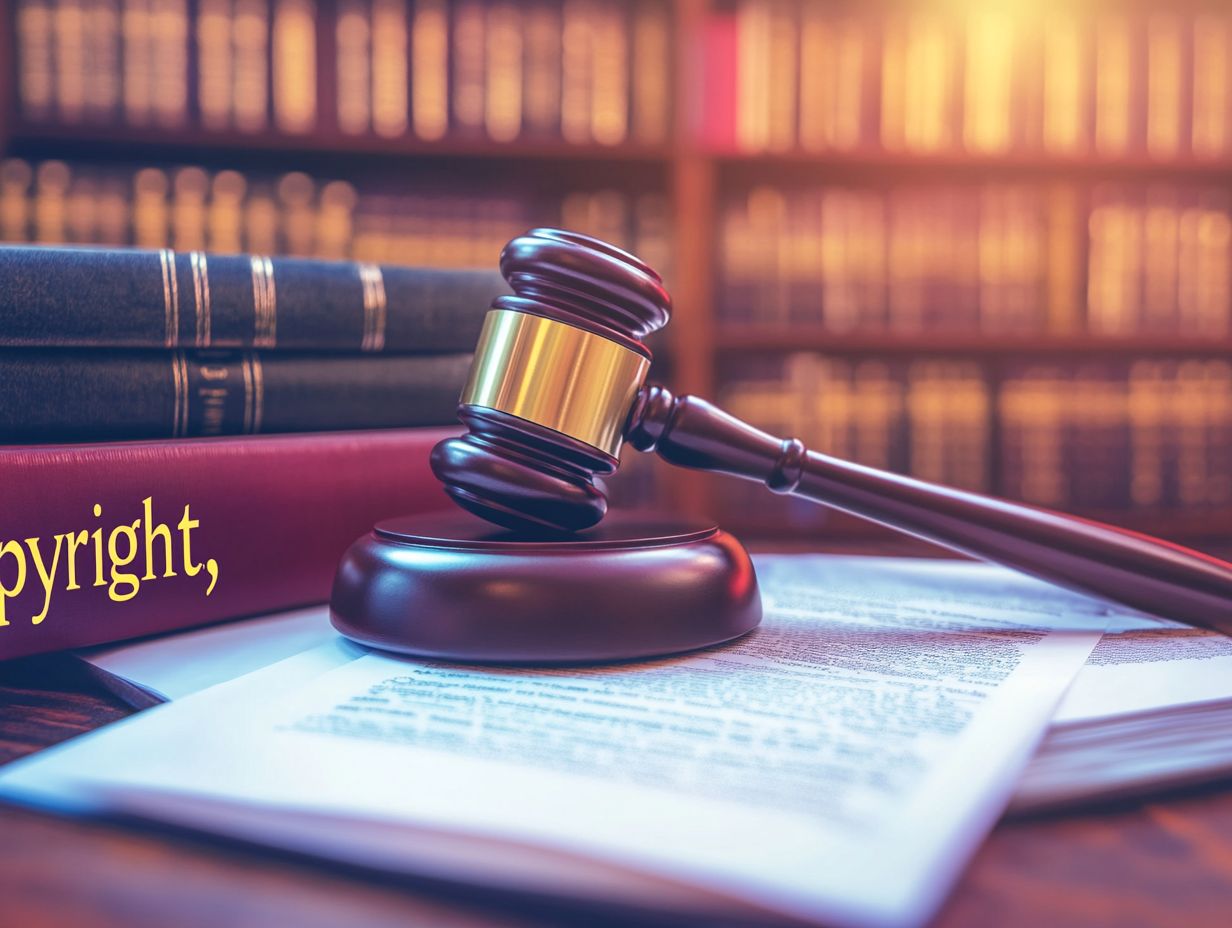
Legal penalties for copyright infringement can lead to both civil and criminal consequences. Copyright owners can seek damages for unauthorized use of their original works.
In civil cases, you have several options to recover damages. Statutory damages can vary widely, potentially reaching up to $150,000 per infringement for willful violations.
Alternatively, actual damages may be awarded, considering lost profits and any gains the infringer made from the misuse. To pursue these options, you’ll need to file a claim in the appropriate court.
Several factors will come into play, including the nature of the infringement, the infringer’s intent, and whether the original work was registered with the copyright office. Grasping these factors is crucial; it can make a real difference in your case!
How to Avoid Copyright Infringement
Understanding copyright laws is essential for both creators and users. You can protect yourself by following best practices in copyright law.
This includes understanding fair use and recognizing the importance of registration.
Best Practices for Staying Within the Law
Implementing best practices for navigating copyright law is vital for you as a creator or business professional. This ensures that your original expressions are protected while respecting the rights of others.
Prioritize obtaining necessary permissions before using any copyrighted material. Additionally, understanding and applying fair use principles allows you to use protected works for commentary, criticism, or educational purposes without infringing on ownership rights.
Registering a copyright for your original works provides legal protection and enhances your credibility. This makes it easier to enforce your rights should disputes arise.
By adhering to these guidelines, you can cultivate a respectful creative environment while safeguarding your own intellectual property.
Watch this video for a deeper understanding of copyright laws and how to protect your work.
Frequently Asked Questions
What is copyright infringement?
Copyright infringement is the unauthorized use of someone else’s original work without their permission or proper attribution. This includes copying, distributing, or using the work for commercial gain.
What is considered copyrightable material?
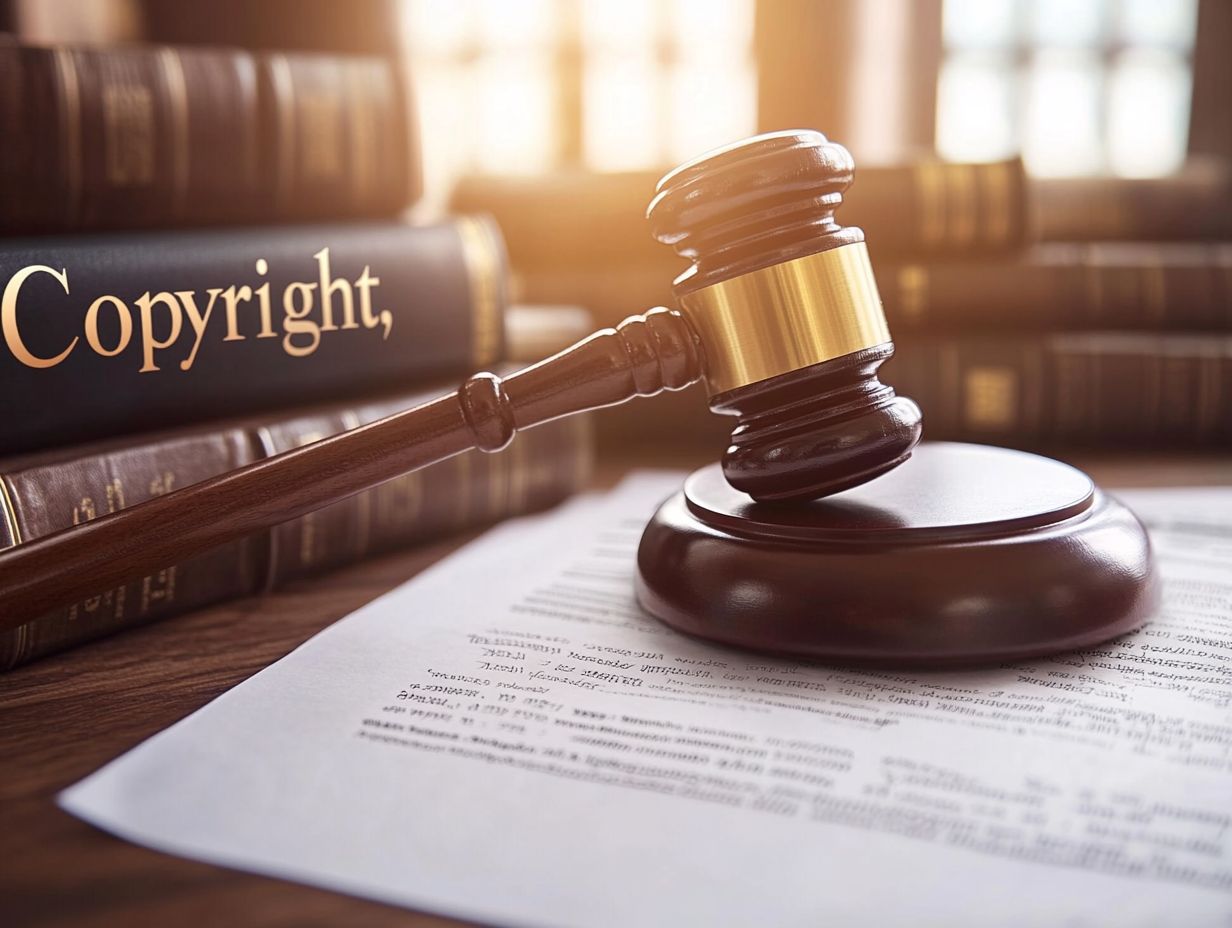
Copyrightable material includes any original expression of ideas, such as literary works, artistic creations, music, and film. It also encompasses software, databases, and architectural designs.
What are the consequences of copyright infringement?
The consequences of copyright infringement can include legal action, fines, and damages owed to the copyright owner. In severe cases, it may even lead to imprisonment.
How can I protect my work from copyright infringement?
The best way to safeguard your work is to register it with the copyright office. This provides legal proof of ownership and makes it easier to take legal action if infringement occurs.
What is fair use?
Fair use allows limited use of copyrighted material without permission for purposes like criticism, comment, news reporting, teaching, scholarship, or research. However, fair use is subjective and can vary from case to case.
What should I do if I receive a notice of copyright infringement?
If you receive a notice of copyright infringement, seek legal advice immediately. You may need to remove the infringing material and resolve the issue with the copyright owner to avoid further legal action.
Ready to protect your creative work? Consult a legal professional for more guidance on copyright laws and best practices.

